- Home
- Gore Vidal
Lincoln
Lincoln Read online
ACCLAIM FOR
GORE VIDAL’s
LINCOLN
“A brilliant marriage of fact and imagination. It’s just about everything a novel should be—pleasure, information, moral insight. [Vidal] gives us a man and a time so alive and real that we see and feel them.… A superb book.”
—The Plain Dealer
“Utterly convincing … Vidal is concerned with dissecting, obsessively and often brilliantly, the roots of personal ambition as they give rise to history itself.”
—Joyce Carol Oates, The New York Times Book Review
“An astonishing achievement.… Vidal is a masterly American historical novelist.… Vidal’s imagination of American politics, then and now, is so powerful as to compel awe.”
—Harold Bloom, The New York Review of Books
“The best American historical novel I’ve read in recent years.”
—Arthur Schlesinger, Jr., Vanity Fair
“[A] literary triumph. There is no handy and cheap psychoanalysis here, but rather a careful scrutiny of the actions that spring from the core of Lincoln himself.… We are left to figure out the man as if he were a real person in our lives.”
—Chicago Sun-Times
“Lincoln reaches for sublimity.… This novel will, I suspect, maintain a permanent place in American letters.”
—Andrew Delbanco, The New Republic
“Vidal is the best all-round American man of letters since Edmund Wilson.… This is his most moving book.”
—Newsweek
“It is remarkable how much good history Mr. Vidal has been able to work into his novel. And I find—astonishingly enough, since I have been over this material so many times—that Mr. Vidal has made of this familiar record a narrative that sustained my interest right up to the final page.”
—Professor David Donald, Harvard University
GORE VIDAL
LINCOLN
Gore Vidal was born in 1925 at the United States Military Academy at West Point. His first novel, Williwaw, written when he was nineteen years old and serving in the Army, appeared in the spring of 1946. Since then he has written twenty-two novels, five plays, many screenplays, short stories, well over two hundred essays, and a memoir.
NARRATIVES OF EMPIRE
BY
GORE VIDAL
Burr
Lincoln
1876
Empire
Hollywood
Washington, D.C.
The Golden Age
FIRST VINTAGE INTERNATIONAL EDITION, FEBRUARY 2000
Copyright © 1984 by Gore Vidal
All rights reserved under International and Pan-American Copyright Conventions. Published in the United States by Vintage Books, a division of Random House, Inc., New York, and simultaneously in Canada by Random House of Canada Limited, Toronto. Originally published in hardcover in the United States by Random House, Inc., New York, in 1984.
Vintage is a registered trademark and Vintage International and colophon are trademarks of Random House, Inc.
The Library of Congress has cataloged the Random House edition as follows:
Vidal, Gore, 1925–
Lincoln.
1. Lincoln, Abraham, 1809–1865–Fiction. I. Title.
PS3543.126L5 1984 813′.54 83-43185
eISBN: 978-0-307-78423-0
www.vintagebooks.com
v3.1
Contents
Cover
About the Author
Other Books by This Author
Title Page
Copyright
Part I
Chapter One
Chapter Two
Chapter Three
Chapter Four
Chapter Five
Chapter Six
Chapter Seven
Chapter Eight
Chapter Nine
Chapter Ten
Chapter Eleven
Chapter Twelve
Chapter Thirteen
Chapter Fourteen
Chapter Fifteen
Chapter Sixteen
Chapter Seventeen
Chapter Eighteen
Chapter Nineteen
Chapter Twenty
Part II
Chapter One
Chapter Two
Chapter Three
Chapter Four
Chapter Five
Chapter Six
Chapter Seven
Chapter Eight
Chapter Nine
Chapter Ten
Chapter Eleven
Chapter Twelve
Part III
Chapter One
Chapter Two
Chapter Three
Chapter Four
Chapter Five
Chapter Six
Chapter Seven
Chapter Eight
Chapter Nine
Chapter Ten
Chapter Eleven
Chapter Twelve
Afterword
PART I
ONE
ELIHU B. WASHBURNE opened his gold watch. The spidery hands showed five minutes to six.
“Wait here,” he said to the driver, who said, “How do I know you’re coming back, sir?”
At the best of times Congressman Washburne’s temper was a most unstable affair, and his sudden outbursts of rage—he could roar like a preacher anticipating hell—were much admired in his adopted state of Illinois, where constituents proudly claimed that he was the only militant teetotaller who behaved exactly like a normal person at five minutes to six, say, in the early morning of an icy winter day—of the twenty-third of February, 1861, to be exact.
“Why, you black—!” As the cry in Washburne’s throat began to go to its terrible maximum, caution, the politician’s ever-present angel, cut short the statesman’s breath. A puff of unresonated cold steam filled the space between the congressman and the Negro driver on his high seat.
Heart beating rapidly with unslaked fury, Washburne gave the driver some coins. “You are to stay here until I return, you hear me?”
“I hear you, sir.” White teeth were quickly bared and unbared in the black, cold-puckered face.
Washburne buttoned up his overcoat and stepped carefully onto the frozen mud that was supposed to be the pavement of a stately avenue leading to the squalid train depot of Washington City, capital of thirty-four United States that were now in the process of disuniting. He fluffed up his beard, hoping to better warm his face.
Washburne entered the depot as the cars from Baltimore were rattling to a halt. Negro porters were slouched along the sidings. Huge carts stood ready to be filled with Northern merchandise to be exchanged for Southern tobacco, raw cotton, food. Currently, the Southerners were saying that Washington City was the natural capital of the South. But they did not say it, if they were wise, in Washburne’s irritable Western presence.
Just past the locomotive, the representative of Illinois’s first District stationed himself in front of an empty gilded wagon whose sides were emblazoned with the name of Gautier, the town’s leading caterer, a Frenchman who was, some claimed but never he, the lost Dauphin of France.
As Washburne watched the sleepy travellers disembark, he wished that he had brought with him at least a half-dozen Federal guards. Since the guards were just coming off night duty, no one would think it odd if they should converge, in a casual sort of way, upon the depot. But the other half of the semi-official Joint Congressional Committee of Two, Senator William H. Seward of New York, had said, “No, we don’t want to draw any attention to our visitor. You and I will be enough.” Since the always-mysterious Seward had then chosen not to come to the depot, only the House of Representatives was represented in the stout person of Elihu B. Washburne, who was, suddenly, attracted to a plainly criminal threesome. To the left, a small sharp-eye
d man with one hand plunged deep in his overcoat pocket where the outline of a derringer was visible. To the right, a large thickset young man with both hands in his pockets—two pistols? In the center, a tall thin man, wearing a soft slouch hat pulled over his eyes like a burglar, and a short overcoat whose collar was turned up, so that nothing was visible between cap and collar but a prominent nose and high cheekbones covered with yellow skin, taut as a drum. In his left hand he clutched a leather grip-sack containing, no doubt, the tools of his sinister trade.
As the three men came abreast of Washburne, the congressman said, “Well, you can’t fool me, Abe.”
The small man turned fiercely on Washburne, hand half out of his overcoat pocket, revealing the derringer’s barrel. But the tall man said, “It’s all right, Mr. Pinkerton. This is Congressman Washburne. He’s our welcoming committee.”
Warmly, Washburne shook the hand of his old friend the President-elect of the United States, Abraham Lincoln, a fellow politician from Illinois, who was supposed to be murdered later on in the day at Baltimore.
“This is Ward Hill Lamon.” Lincoln indicated the thickset man, who withdrew his right hand from his pocket to shake the hand of Washburne, who stared dumbly at Lamon’s hand, ablaze with what looked to be barbarous jewellery.
Lincoln laughed. “Hill, when you’re in the big city you take your brass knuckles off.”
“It’s in this city that I better keep them on.” And Washburne noticed that Lamon—who spoke with a Southern accent—did exactly that. Meanwhile, Pinkerton had moved on ahead, studying the passers-by with such suspicion that he himself began to attract attention. Lincoln said what Washburne was thinking. “Mr. Pinkerton is what they call a detective, and detectives always make quite a fuss, trying not to be noticed.”
To Washburne’s relief, no one recognized Lincoln. But then he himself had been in a moment’s doubt when Lincoln had pushed down his collar, to reveal a short, glossy black beard that entirely changed the shape—and expression—of his face.
“Is it false?” Washburne stared hard. They were now standing beneath a huge poster of “Abraham Lincoln, the President-elect. Welcome to Washington City.” The cleanshaven face of the poster was hard, even harsh-looking, while the bearded face looked weary, but amiable. To Washburne, the President-elect resembled a prosperous, down-state Illinois farmer come to market.
“No, it’s real. What you might call an adornment. I had to do something useful on the train from Springfield.” Lincoln leapt to one side as two huge black women carrying a tub of pork sausage meat hurried toward the cars. Then Pinkerton motioned that they were to follow him outside.
As they moved toward the door of the depot, Washburne said, “I’ve hired a carriage. Governor Seward was supposed to meet us here. But he must’ve overslept. We’ve put you up at Willard’s Hotel. General Scott thinks you’ll be safer there than in that house we found for you.”
Lincoln did not answer. Washburne wondered if he was listening. Outside the depot, the shrunken wintry sun resembled a small, pale, yellow seal affixed to the parchment-gray sky to the left of where the Capitol’s dome should be but was not. Instead, from the round marble base, reminiscent of one of Gautier’s white wedding cakes, a large crane was silhouetted against the sky like a gallows.
“They took the old lid off, I see.” Lincoln ignored Pinkerton’s efforts to get him into the waiting barouche.
“God knows when they’ll get the new one on,” said Washburne. “There’s talk in Congress that we should just leave it the way it is.”
“No.” Lincoln shivered suddenly. “I always forget,” he said, “how cold the South gets in winter.”
The four men climbed into the carriage. Pinkerton sat next to the driver. Lamon sat with his back to the driver’s seat while Lincoln and Washburne shared the back seat. Washburne noticed that Lincoln never let go of the grip-sack. Even while seated, he clutched it so hard that the huge knuckles of his hand were white.
“The crown jewels?” Washburne indicated the case. Lincoln laughed, but did not release his hold on the handle. “My certificate of good character. It’s the inaugural address. I gave it to my son Bob to look after and he mislaid it in Harrisburg. The only copy there is!” Lincoln visibly winced at the memory. “We had to go through two tons of luggage to find it. I could’ve killed that boy. Anyway, I’ve carried it ever since.”
“We’re all sort of curious to hear what you’ll say …” began Washburne.
But Lincoln was not to be drawn out. “I see there’s been some new building going on.” He looked out the window at the north side of Pennsylvania Avenue where the great hotels were lined up, like so many brick barracks interspersed with saloons and shops. Near the corner of Sixth Street was Brown’s Hotel.
“Brown’s was here when you were here in the forties.”
Lincoln nodded. “Mrs. Lincoln and I spent our first night in Washington there. Then we moved to a boardinghouse with the two boys, who were not as popular as they ought to have been. The Widow Spriggs, our landlady was called.”
On Twelfth Street there was the Kirkwood House and, finally, on the corner of Fourteenth Street and Pennsylvania Avenue, stood the center of the city’s political and social life, Willard’s Hotel, nicely situated opposite the Treasury Building, which was placed, most symbolically everyone thought, in a line with the hotel and the President’s House.
At six-thirty in the morning the city was not yet properly awake. The hacks that were usually lined up in front of each hotel were not to be seen. Only Negroes—slave and free—were on the move, bringing food to the hotels, cleaning the stairs of the houses and taverns, moving briskly in the cold.
“I see they’ve made a stab at paving the avenue,” said Lincoln, as the carriage skittered over cobbles so ill-set that they made the avenue look even more like a vast, wild field than plain frozen mud might have done. “Not a very serious stab,” he added.
At the end of Pennsylvania Avenue, the original city planners had intended that the President’s House should face, in constitutional harmony, the Capitol. But the Treasury building now blocked most of the view of the Executive Mansion, while the rest was hidden by a large windowless red-brick building, which intrigued Lincoln. “That’s new. What is it? A prison?”
“No. That’s President Buchanan’s barn. He’s very proud of it. In fact, it’s about the only thing he’s done in four years.”
A horsecar rattled into view, only half full at this early hour; the stove at the back of the car smoked badly.
“The trolleys are since your time,” said Washburne. “They now go all the way from the Navy Yard to Georgetown. That’s six miles,” Washburne added, aware that he had once again lost his old friend’s attention. The curiously lidded left eye—like a frog’s—was half shut, always a sign that its owner was either deep in thought or mortally tired.
The main entrance to Willard’s Hotel was at the corner where Fourteenth Street and Pennsylvania Avenue met. Bare trees sprouted from the brick sidewalk to either side of the door; farther down the avenue a small Greek temple had been completely enveloped by the huge hotel.
“You remember the old Presbyterian church?” Washburne was beginning to feel like a city guide. “Well, now it’s a part of Willard’s. It’s a concert hall. The Peace Conference is meeting there.” He examined Lincoln’s face to see what his reaction might be, but there was none.
The carriage stopped at the main door. A uniformed Negro helped the men out of the carriage. “Baggage, gentlemen?”
“By the next train,” said Lincoln.
“But, gentlemen—” Pinkerton spun the man to one side. “This way,” Pinkerton said, darting into the hotel.
“A very forceful individual,” Lincoln observed, with a smile.
Inside the lobby, a half-dozen black porters dozed on their feet while an assistant manager of uncommon whiteness—as if in deliberate hierarchical contrast to the staff—examined a heap of letters at his marble counter. The lobby wa
s high-ceilinged and smelled of coal smoke. Huge dark armchairs were set haphazardly about the room, each with its shining spittoon to hand. Benches of horsehair lined the walls. A few forlorn guests stood surrounded by luggage, waiting to be taken away.
Pinkerton caught the assistant manager’s attention by slamming his fist on the marble counter. What had been the whitest of faces turned pink with irritation; then even whiter than before when Pinkerton whispered in his ear. The assistant manager hurried from behind his reception counter; shook Washburne’s hand and said in a voice that broke with tension, “Welcome to Willard’s Hotel, Mr. President.”
“This is the President,” said Washburne, indicating Lincoln.
“President-elect,” said Lincoln. “Let’s not tempt fate. There’s still ten days to go yet.”
“Your rooms, sir, aren’t ready.” The assistant manager addressed Lamon, who had taken Washburne’s place as Lincoln in his mind. “You see, we didn’t expect you until this afternoon and Mr. William Dodge, of New York—he’s the merchant prince, a valued customer—is in Parlor Suite Number Six and as it’s only six-thirty-four, he’s not even up yet, I’m fairly certain …”
Lincoln turned to Lamon, “You work this one out.” At that moment an aged white porter approached Washburne and, in a pronounced brogue, said, “Well, Mr. Washburne, sir, I see you’ve brought us a president.”
“This is Mike,” said Washburne to Lincoln, “the most cunning man in the city.”
“So cunning, sir, that he’ll take you straight to Governor Seward.” With that, Lincoln and Washburne were led into the main dining room, where Seward sat alone at the end of a long table, puffing a cigar, eyes half-closed. Back of him, waiters were placing chafing dishes on a huge buffet; otherwise, the vast room was empty.
At the sight of Lincoln, Seward sprang to his feet; he was not, Washburne noted, much taller standing than seated. Once red-haired, now white-haired, large-nosed, pale-eyed, long-time master of the state of New York not to mention of the youthful Republican Party, as well as President-that-might-have-been had Lincoln’s managers not outmaneuvered his managers at the Chicago Convention, William H. Seward was seven years older than his rival, the new President, whose hand he now shook, saying in a husky voice, richly seasoned by a lifetime’s addiction to cigar smoke and snuff, “You’re every bit as tall as I’d thought you’d be, Mr. Lincoln.” Seward looked up at Lincoln, who was exactly a foot taller than he. “I never really got a good look at you when we met for those two minutes during the campaign.”

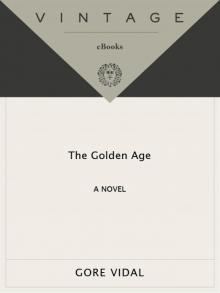 The Golden Age: A Novel
The Golden Age: A Novel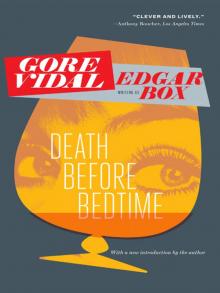 Death Before Bedtime
Death Before Bedtime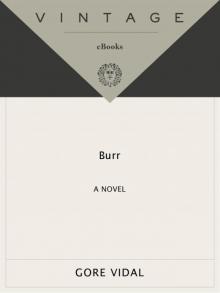 Burr
Burr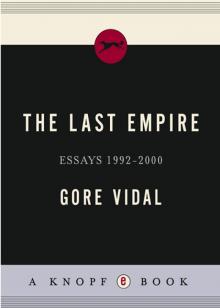 The Last Empire
The Last Empire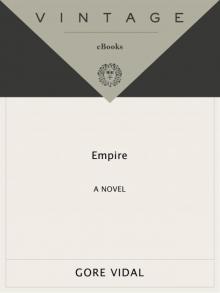 Empire: A Novel
Empire: A Novel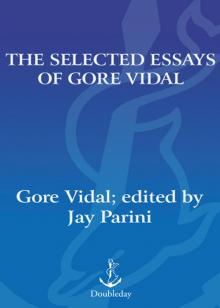 The Selected Essays of Gore Vidal
The Selected Essays of Gore Vidal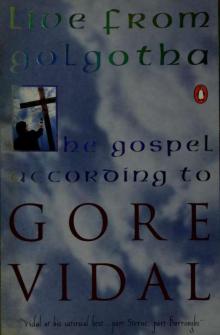 Live From Golgotha
Live From Golgotha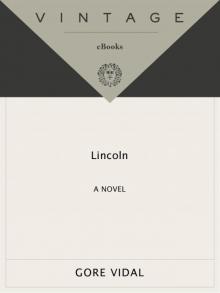 Lincoln
Lincoln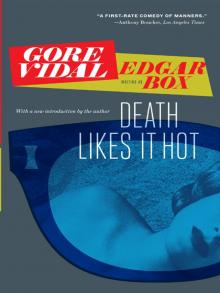 Death Likes It Hot
Death Likes It Hot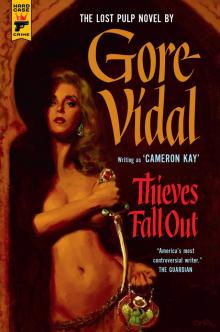 Thieves Fall Out (Hard Case Crime)
Thieves Fall Out (Hard Case Crime)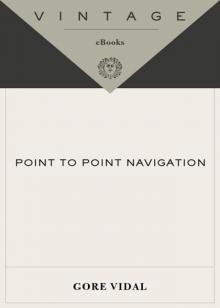 Point to Point Navigation
Point to Point Navigation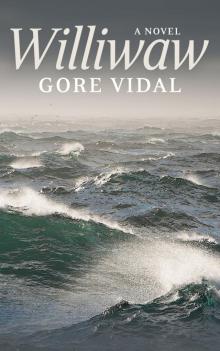 Williwaw
Williwaw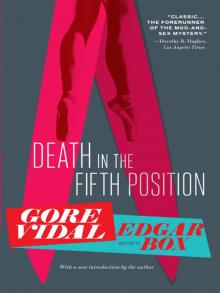 Death in the Fifth Position
Death in the Fifth Position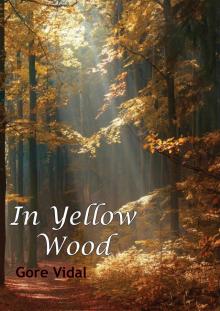 In a Yellow Wood
In a Yellow Wood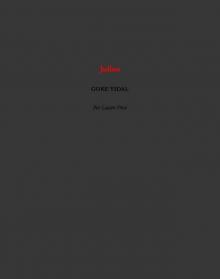 Julian
Julian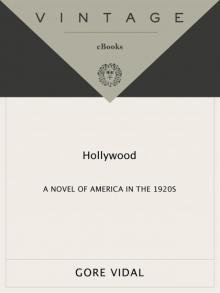 Hollywood
Hollywood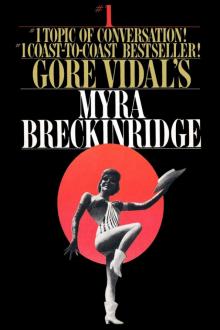 Myra Breckinridge
Myra Breckinridge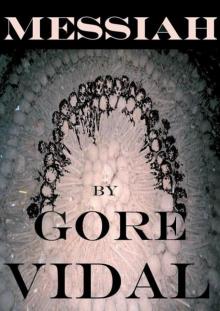 Messiah
Messiah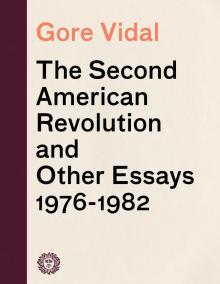 The Second American Revolution and Other Essays 1976--1982
The Second American Revolution and Other Essays 1976--1982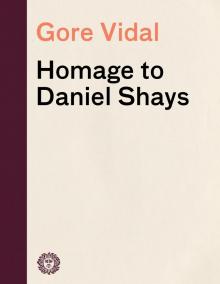 Homage to Daniel Shays
Homage to Daniel Shays Empire
Empire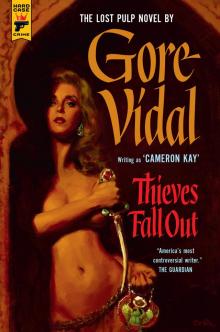 Thieves Fall Out
Thieves Fall Out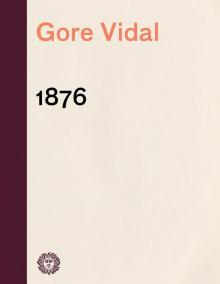 1876
1876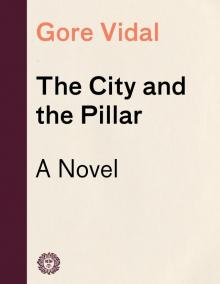 The City and the Pillar
The City and the Pillar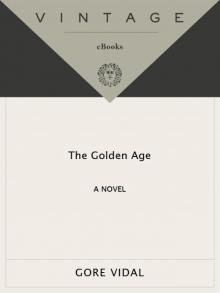 The Golden Age
The Golden Age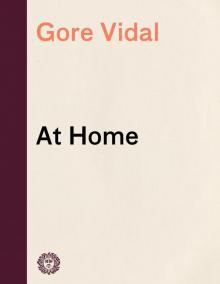 At Home
At Home